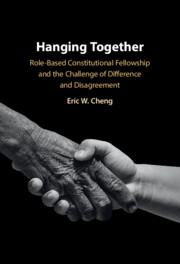 Hanging Together
Hanging Together Book contents
- Hanging Together
- Hanging Together
- Copyright page
- Contents
- Acknowledgments
- 1 Introduction
- 2 Aiming Too High, Aiming Too Low
- 3 Fellowship’s Forefather
- 4 Broadening the Base
- 5 Three Dimensions of Trust
- 6 Principled Pragmatists, Principled Purists, and the Liberal Democratic Front
- 7 Talking, Shouting Back, and Listening Better
- 8 Justifying (and Constraining) Salutary Hypocrisy
- 9 Facilitating Fellowship
- 10 Conclusion
- Index
5 - Three Dimensions of Trust
Published online by Cambridge University Press: 07 July 2022
- Hanging Together
- Hanging Together
- Copyright page
- Contents
- Acknowledgments
- 1 Introduction
- 2 Aiming Too High, Aiming Too Low
- 3 Fellowship’s Forefather
- 4 Broadening the Base
- 5 Three Dimensions of Trust
- 6 Principled Pragmatists, Principled Purists, and the Liberal Democratic Front
- 7 Talking, Shouting Back, and Listening Better
- 8 Justifying (and Constraining) Salutary Hypocrisy
- 9 Facilitating Fellowship
- 10 Conclusion
- Index
Summary
Chapter 5 lays the groundwork for the discussions of role-based constitutional fellowship in Chapters 6–9. In addition to arguing that fellowship is a self-initiating brand of liberal democratic trust, this chapter shows that fellowship assumes different complexions in different contexts. First, when trust exists in the formal political sphere, political actors compete as adversaries with a sense of self-restraint. Such trust involves counteracting “the institutionalized enmity problem,” the tendency for political actors to compete as enemies. Second, when trust exists in the general citizenry, citizens treat one another in manners befitting their equal citizenship, despite their differences. Such trust involves counteracting “the social domination problem”: enough citizens must demonstrate that they take the persistence of undue social hierarchies seriously. Third, when trust exists between the political sphere and the general citizenry, citizens believe that political actors largely do try to further the public good. Such trust involves counteracting “the representative cynicism problem,” the tendency for citizens to believe that political actors are in it for themselves.
Keywords
- Type
- Chapter
- Information
- Hanging TogetherRole-Based Constitutional Fellowship and the Challenge of Difference and Disagreement, pp. 85 - 94Publisher: Cambridge University PressPrint publication year: 2022


